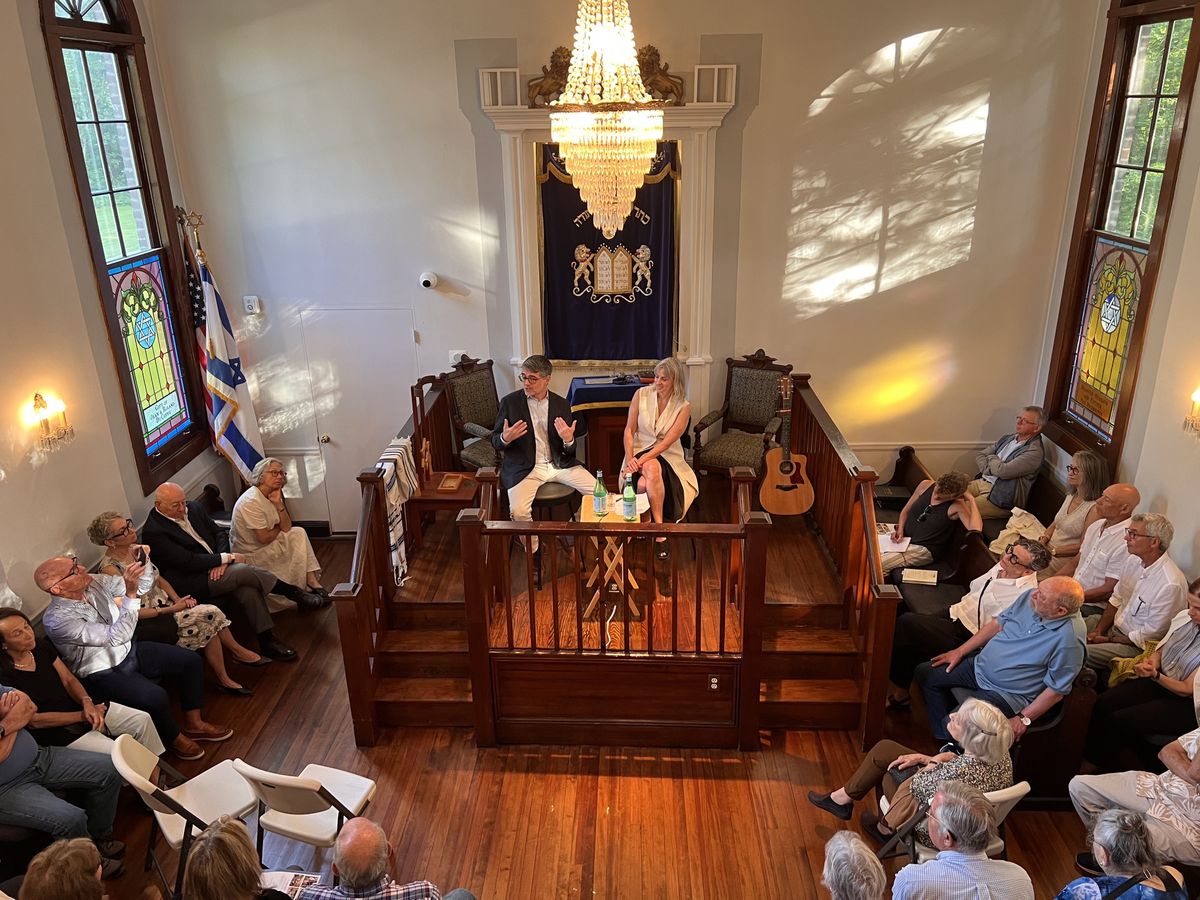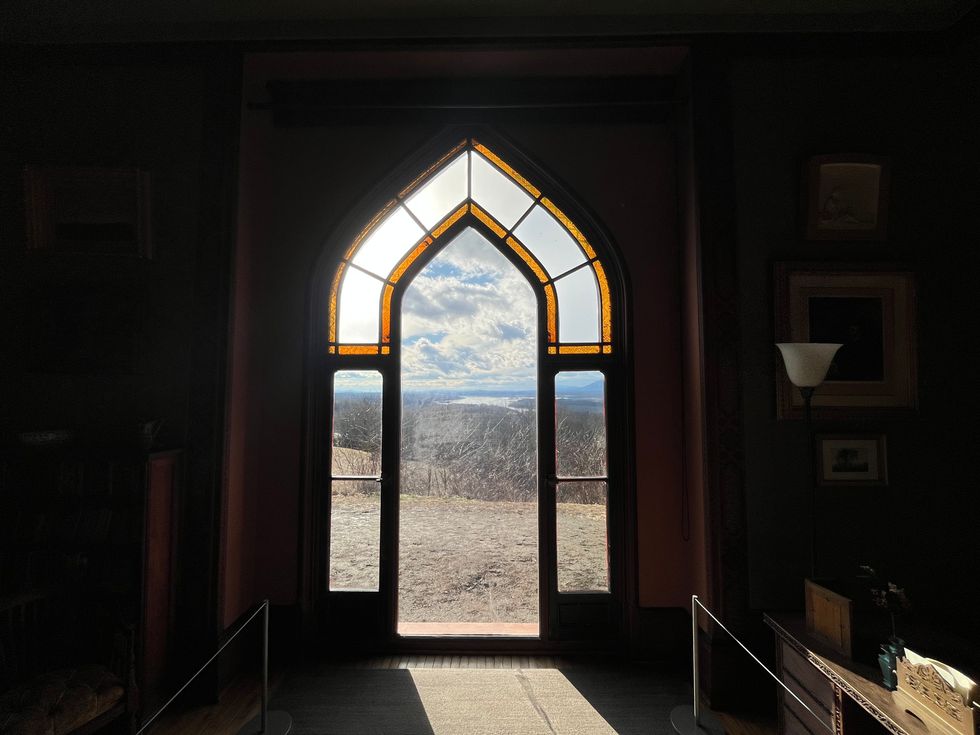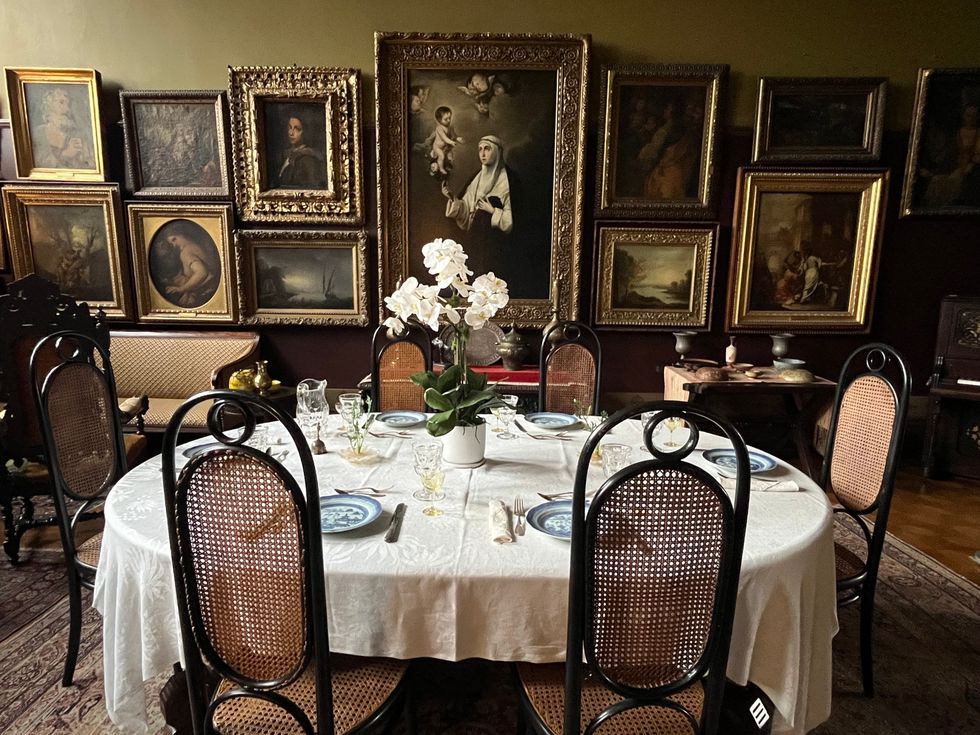The Dreyfus Affair at Congregation Beth David

Maurice Samuels speaks at Congregation Beth David, July 30.
Gregg Osofsky

Maurice Samuels speaks at Congregation Beth David, July 30.
On the evening of July 30, Congregation Beth David in Amenia became the epicenter of a deep dive into one of history’s most profound and politically charged scandals. Maurice Samuels, a distinguished professor at Yale University and the director of its Program for the Study of Antisemitism, captivated a full house with his insights on the Dreyfus Affair, drawn from his latest book, “Alfred Dreyfus: The Man at the Center of the Affair.” The event, skillfully moderated by culture writer Laura van Straaten, opened a deep and complicated discussion into how historical events like the Dreyfus Affair continue to offer valuable lessons, illuminating the challenges and stakes of our own times.
After a brief welcome by Rabbi Jon Haddon, spiritual director of Congregation Beth David, the event opened with an introduction by Ilene Smith, editorial director of the Jewish Lives biography series and a member of the congregation. Smith described the series of biographies, for which Samuels was commissioned, as a “remarkable opportunity to curate deep and interesting biographies about influential figures with a real legacy.” There are now 70 books in the collection all of which “ask the question: What does it mean to be Jewish?” Smith explained.
Samuels and Van Straaten met in Kindergarten in Chicago and have been lifelong friends, so the conversation flowed easily and seamlessly throughout the evening. To provide context, Samuels began with a succinct summary of the Dreyfus Affair. In 1894, Alfred Dreyfus, a Jewish officer in the French army, was falsely accused of spying for Germany. With scant evidence, Dreyfus was publicly humiliated, stripped of his rank in a degrading ceremony, and exiled to the brutal penal colony of Devil’s Island. For five years, he endured inhumane conditions, while back in France, his family, particularly his wife, Lucie, fought tirelessly to prove his innocence. The affair divided France into Dreyfusards (supporters of Dreyfus) and anti-Dreyfusards, leading to widespread riots and political turmoil. Dreyfus was eventually exonerated in 1906 and restored to his military rank.
Samuels highlighted the complex socio-political landscape of France during the Dreyfus Affair, noting that despite France being the first European country to grant Jews full civil rights during the French Revolution, antisemitism was rampant by the late 19th century. Dreyfus, a patriotic and wealthy officer, became a scapegoat amid rising antisemitic sentiments. “Half of France committed to believing a lie,” said Samuels. “Even after it was proven that Dreyfus was innocent, people still opposed justice for Dreyfus.” He went on to explain that “France is a paradox in some ways, a kind of conundrum for scholars of antisemitism because it was the country where Jews had achieved the most, where Jews were the most integrated in the world by the 1890s.” But Jews, Samuels explained, were associated with all the changes brought on by modernity, “And by modernity, I mean, the rise of modern industrial capitalism, liberal democracy, and then all the social changes that go along with that. The people left behind by these changes became antisemitic.”
Also deeply examined was the significant role played by intellectuals like Emile Zola whose famous open letter “J’Accuse” accused the French military of a cover-up during the Dreyfus affair, igniting public outrage and prompting a re-examination of the case. In fact, said Samuels, “people say that the modern use of the term intellectual to designate someone who has a cultural position but who takes a stand on political issues, dates to the Dreyfus affair. The most famous one we can talk about is Emile Zola, the novelist. But many writers were anti-Dreyfusard including Jules Verne, for example, the science fiction writer.” The case also caused a divide amongst Impressionist painters with Monet and Pissaro, who was Jewish, being pro-Dreyfus and others such as Degas, Renoir, Rodin and Cezanne who were anti-Dreyfus. This polarization also filtered into the media landscape of the time, which Van Straaten noted bears striking similarities to today’s media environment. “I found myself thinking about how divided our country is culturally and socially again and again,” said Van Straaten “and how one of the most fascinating arguments that you make is about the way in which the trials, the imprisonment, and the fight, the affair itself, which endured 12 years, 130 years ago, became and remains a dog whistle, a cultural moment like today in terms of our divisions.”
Samuels added, “I think that you could argue that the Dreyfus affair was a battle in a kind of ongoing war between left and right which is still playing out.”
Samuels also took care to emphasize Dreyfus’s resilience and heroism and the ways in which he emerges as the true hero of his own story. Surviving the harsh conditions of Devil’s Island required immense personal fortitude. Dreyfus’s determination to clear his name, despite being unjustly convicted twice, played a crucial role in eventually bringing the truth to light.
Before opening to questions from the audience, the conversation shifted to the complex process of national healing after deep political divisions with an emphasis on the resilience required to confront and heal from deep-seated injustice. Samuels, reflecting on France post-Dreyfus, emphasized the ongoing struggle to reconcile differing visions of society and how historical events like the Dreyfus Affair offer crucial insights into the modern parallels and challenges we face today. The evening wasn’t just a history lesson; it was a mirror reflecting many of our current societal fractures, leaving the audience pondering the enduring relevance of the Dreyfus Affair, the vital lessons it holds for our times and, indeed, what it means to be Jewish.
A judge recently dismissed one lawsuit tied to the proposed redevelopment, but a separate court appeal of the project’s approval is still pending.
LAKEVILLE — A Connecticut Superior Court judge has dismissed a lawsuit filed against Salisbury’s Planning and Zoning Commission challenging a zoning amendment tied to the controversial expansion of the Wake Robin Inn.
The case focused on a 2024 zoning regulation adopted by the P&Z that allows hotel development in the Rural Residential 1 zone, where the historic Wake Robin Inn is located. That amendment provided the legal basis for the commission’s approval of the project in October 2025; had the lawsuit succeeded, the redevelopment would have been halted.
The decision, issued Jan. 29 by the Superior Court in Torrington, rejected a claim brought by Wells Hill Road residents Angela and William Cruger seeking to nullify the amendment. The Crugers filed the lawsuit in March 2025, arguing the regulation was improperly adopted and amounted to illegal spot zoning intended to benefit the project’s developer, Aradev LLC.
The zoning amendment drew scrutiny when it was adopted, with opponents asserting it was crafted specifically to enable the Wake Robin Inn project. Town officials and land use staff, however, repeatedly said the change was years in the making and intended to address zoning nonconformities affecting historic inns throughout Salisbury.
In a memorandum of decision, the court found the plaintiffs failed to meet their burden of proof that proper notification was lacking. The judge wrote that “a close examination of the record” showed the Crugers did not demonstrate that public notice of the zoning change was procedurally deficient, unduly vague or untimely filed.
The dismissed case is the first of two legal challenges filed by the Crugers related to the Wake Robin Inn redevelopment. A second lawsuit — an appeal of the P&Z’s approval of Aradev’s application to redevelop and expand the inn — remains pending before the court.
Former Planning and Zoning Commission Chair Michael Klemens said that Thursday's ruling brought vindication. In a Jan. 30 email to the P&Z and commission attorney Charles Andres, Klemens said the lawsuit was largely based on claims that he and Land Use Director Conroy had misled the public and the commission during the regulatory process.
“So not only are the regulations recognized by the Superior Court as legally adopted,” Klemens wrote, “but the aspersions cast upon the integrity of staff and your immediate past chair are hopefully finally put to rest.”
Andres informed the Land Use Office and current P&Z Chair Cathy Shyer that the Crugers have 20 days to challenge the court’s ruling.
Olana State Historic Site, the hilltop home created by 19th-century Hudson River School painter Frederic Edwin Church, rises above the Hudson River on a clear winter afternoon.
On a recent mid-January afternoon, with the clouds parted and the snow momentarily cleared, I pointed my car northwest toward Hudson with a simple goal: to get out of the house and see something beautiful.
My destination was the Olana State Historic Site, the hilltop home of 19th-century landscape painter Frederic Edwin Church. What I found there was not just a welcome winter outing, but a reminder that beauty — expansive, restorative beauty — does not hibernate.
2026 marks the 200th anniversary of Church’s birth, making this a particularly timely moment to take in what he created during his lifetime. Church — one of the most notable artists of the Hudson River School movement — was an accomplished landscape painter who gained a reputation as an artist-traveler.
From South America and Western Europe to the Middle East and the Caribbean, Church sought out dramatic, epic scenes that he could capture on canvas and bring back to the U.S. to sell. The profits from those works, in turn, allowed him to create a breathtaking masterwork of his own: Olana.
Olana rises above the Hudson River like a mirage, its Persian-inspired facade an unexpected sight amid the barren winter landscape. With miles of trails, visitors can take in the natural splendor of rolling hills and the river from every angle. From the house itself, the view stretches across the Catskills, a layered panorama of soft blues and silvers that appears all the more dazzling in winter.

Inside the home, the sense of awe deepens. Olana’s interior is rich with color, pattern and texture — warm reds, stenciled walls, intricate woodwork — a striking counterpoint to the monochrome world outside. Light pours through tall windows, framing the Hudson Valley like living paintings.
Every corner of the house pays tribute to the far-flung places Church visited throughout his career. From architectural details to the objects he collected and displayed, visitors are transported to another world. Walking from room to room feels less like touring a house museum and more like stepping into the mind of an artist transfixed by the staggering beauty of the world around him.
As I made my way back down the hill, the winter light fading fast, I felt refreshed in a way that only comes from seeing something anew. Olana is not just a monument to one artist, but a testament to a way of viewing the world — one that values observation, patience and reverence for the natural environment. For those looking to venture out during the colder months and to be reminded why this region has inspired generations of artists and dreamers, there may be no better place to start than Olana.
Olana State Historic Site is located at 5720 State Route 9G, Hudson, New York. For more information and to purchase tours, visit: olana.org

Berkshire Hills Ski League includes Washington Montessori School, Indian Mountain School, Rumsey Hall and Marvelwood School.
CORNWALL — Mohawk Mountain hosted a meet of the Berkshire Hills Ski League Wednesday, Jan. 28.
Housatonic Valley Regional High School earned its first team victory of the season. Individually for the Mountaineers, Meadow Moerschell placed 2nd, Winter Cheney placed 3rd, Elden Grace placed 6th and Ian Thomen placed 12th.
The league includes a mix of private and public schools. HVRHS competed against Washington Montessori School, Indian Mountain School, Rumsey Hall and Marvelwood School.

Conditions were ideal for slalom skiing at Mohawk, albeit cold for spectators with the temperature in the teens. Approximately 20-inches of snow fell earlier in the week.
Mohawk will continue to host weekly meets of the BHSL each Wednesday through the end of the season. The league championship will take place Feb. 25.

State Sen. Stephen Harding
NEW MILFORD — State Sen. and Minority Leader Stephen Harding announced Jan. 20 the launch of his re-election campaign for the state’s 30th Senate District.
Harding was first elected to the State Senate in November 2022. He previously served in the House beginning in 2015. He is an attorney from New Milford.
In his campaign announcement, he said, “There is still important work to do to make Connecticut more affordable, government more accountable, and create economic opportunity. I’m running for reelection to continue standing up for our communities, listening to residents, and delivering real results.”
As of late January, no publicly listed challenger has filed to run against him.
The 30th District includes Bethlehem, Brookfield, Cornwall, Falls Village, Goshen, Kent, Litchfield, Morris, New Fairfield, New Milford, North Canaan, Salisbury, Sharon, Sherman, Warren, Washington, Winchester and part of Torrington.